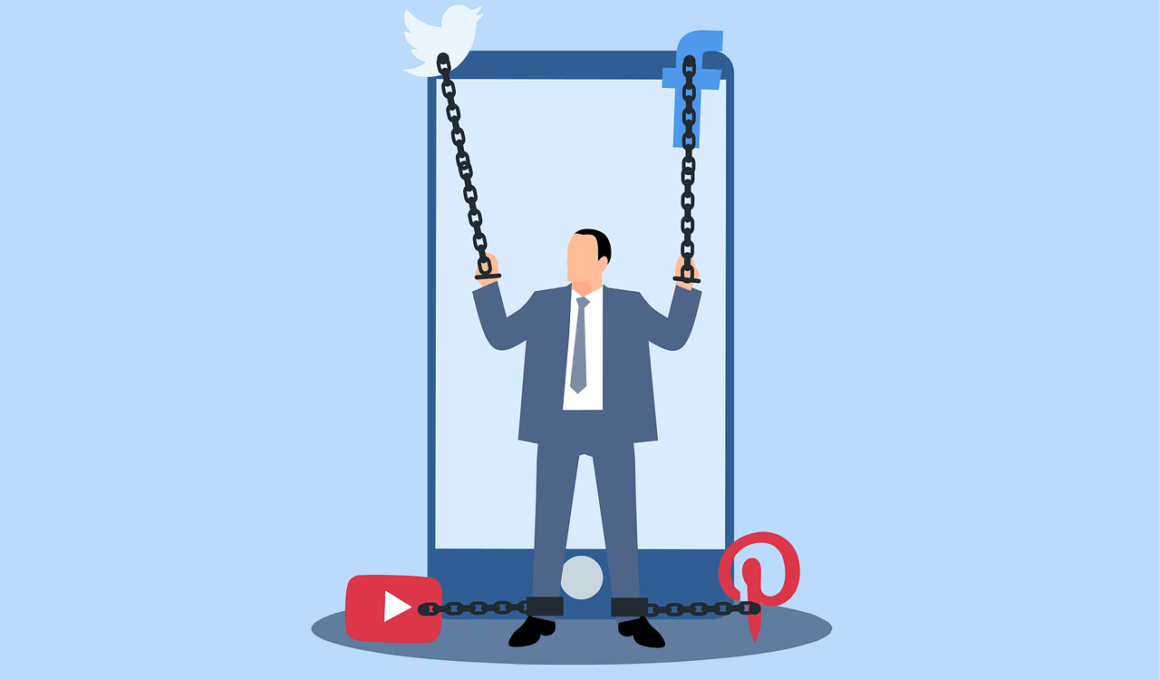Social Media Addiction and its Psychological Impact on Athletes
The digital revolution has drastically shifted how athletes interact with fans, coaches, and their peers. This connectivity can have both empowering and detrimental effects on mental health, particularly when social media usage becomes excessive. Social media serves as a double-edged sword; on one hand, it offers support, boosts engagement, and facilitates communication. Conversely, the psychological toll can lead to addiction, affecting athletes’ performance and well-being. Athletes often find themselves under constant scrutiny, and the pressure amplifies when they are bombarded with other people’s opinions and online feedback. Consequently, it becomes vital for athletes to develop awareness and manage their social media consumption. Experts suggest that athletes should establish boundaries. Consider introducing scheduled times for social media use, limiting interactions that could provoke anxiety. This could enhance emotional resilience. Furthermore, it is crucial for teams to foster a supportive environment that encourages open discussions about these issues. Increasing awareness of the impact of social media on mental health remains essential in the sporting community, assisting athletes in identifying unhealthy patterns and promoting overall mental well-being.
Effects of Social Media on Athletes’ Mental Wellness
Research indicates that social media can foster a sense of community among athletes but can simultaneously exacerbate feelings of inadequacy and anxiety. The phenomenon of “social comparison” becomes prevalent as athletes scroll through meticulously curated highlight reels of their peers. These comparisons can lead to negative self-perception, which detrimentally effects performance. Viewing others’ success tends to create unrealistic expectations and pressure to exceed those levels of achievement. Furthermore, the constant exposure to criticism can deteriorate self-esteem. Negative comments, trolls, and online bullying can lead to feelings of isolation and distress. Studies have found that athletes who engage with social media more frequently report higher levels of anxiety and depression compared to those who limit their use. To counteract the adverse effects, athletes should focus on curating their feed and following uplifting and positive influences. Engaging in real-life connections can also decrease feelings of loneliness, providing athletes the necessary emotional support. Balancing online presence with exploring offline hobbies can help maintain mental health. Creating opportunities for face-to-face interactions is essential in combating the loneliness that excessive social media usage can induce.
Social media platforms can create unrealistic standards, which adversely impact an athlete’s self-worth and motivation. Finding the right balance between engagement and detachment from the online world is crucial for mental health. Athletes often feel pressured to maintain their online personas and may experience conflict between their authentic selves and the image they portray. This phenomenon, known as “impression management,” drives many to craft a perfect digital narrative, potentially leading to unintended consequences. An unhealthy focus on social media can detract attention from essential responsibilities, including training and personal relationships. Physical performance may decline if an athlete allocates too much time to developing their online presence. Furthermore, this divide between their public and private lives can also lead to increased feelings of alienation. Engaging with professional mental health providers familiar with the demands of professional athletes can foster healthier coping mechanisms. Mental health training should incorporate discussions on the impacts of social media, guiding athletes toward responsible use. With proper interventions, athletes can harness social media positively, leveraging it as a platform for inspiration and motivation without sacrificing their mental well-being.
Strategies for Positive Social Media Engagement
To navigate the complexities of social media, athletes can adopt various strategies for healthier engagement. Identifying personal values and aligning them with online interactions can help cultivate a positive mindset. Maintaining control over one’s digital narrative can involve unfollowing negative accounts or sources that foster comparison and anxiety. Additionally, practicing mindfulness in social media consumption can allow athletes to be present and conscious of their feelings while scrolling. Setting specific goals before using social media, such as connecting with friends or sharing accomplishments without focusing on validation, can create a more enjoyable experience. Integrating breaks into periods of social media use also has benefits, allowing athletes to decompress and refocus on their mental wellness. Regularly assessing their relationship with social media can lead to greater self-awareness, minimizing detrimental impacts. Encouraging dialogues with fellow athletes regarding their experiences can further foster community and shared understanding. Combating the pressures of social media should be a collective effort, and access to resources educating athletes about mental health is crucial. Establishing healthy habits can significantly enhance their experience, both online and offline.
While social media can serve to bolster athletes’ connections, it also acts as a vessel where misinformation and unrealistic comparisons thrive. As a result, athletes must be vigilant in recognizing how these elements can mislead them about their journey. The prevalence of filtered images and curated success stories can distort perceptions of reality. It’s important for athletes to understand that everyone’s journey is unique. Engaging in social media consumption requires a critical lens. Athletes should consistently remind themselves that they only see a fraction of someone else’s life through their posts. Emotional vulnerability can be shared openly, creating authentic connections. Therefore, embracing the reality of one’s struggles may resonate more with followers, fostering genuine community support. Encouraging athletes to share both challenges and triumphs assists in normalizing the idea that failure is part of growth. It is essential to contextualize success in the realm of personal growth, as opposed to comparative standards. Implementing adequate coping strategies and coping mechanisms can help athletes differentiate between inspiration and harmful comparison while using social media, preserving mental balance and resilience.
The Role of Coaches and Support Systems
Effective communication between athletes and their coaches is integral. Coaches play a pivotal role in acknowledging the psychological aspects of athletes’ lives, including social media’s impact. They must actively promote a balanced digital presence by fostering open discussions about mental health and social media use. Establishing trust within teams can create an environment where athletes comfortably address their concerns, be it related to performance, pressure, or online interactions. Mental health resources, such as workshops and sessions on digital literacy, equip athletes with the tools to understand the intricacies of social media better. Coaches can also implement strategies that encourage reduced screen time coupled with effective performance tracking. Providing athletes with constructive feedback not only aids in performance improvement but also positively influences their mental health. Collaborating with mental health professionals well-versed in the unique pressures athletes face can enhance support systems. Sport programs should prioritize mental wellness alongside physical performance, equipping athletes with immediate resources. By fostering supportive relationships, coaches enhance athletes’ abilities to navigate the pitfalls of social media and understand their mental health better.
In conclusion, the intersection of social media and athletes’ mental health is complex and multifaceted. Addressing the impact of social media addiction requires a grassroots approach that prioritizes education, awareness, and healthy digital interaction. Athletes who actively manage their social media presence can cultivate a favorable climate that supports both their mental and physical well-being. Strategies that promote digital literacy and constructive self-reflection are vital. Organizations looking to enhance athletes’ mental health should implement comprehensive programs promoting mental wellness and fostering open communication. Future research into this phenomenon can yield insights into further effective management techniques and constraints surrounding social media use. Athletes must develop resilience in a world where digital engagement is constant. Both individual efforts and broader organizational changes will be essential in mitigating the negative impacts of social media addiction. Awareness campaigns, support workshops, and communication lines must be prioritized to foster healthy environments. As athletes gain control over their social media presence, they can utilize it as a positive force for growth and connection, rather than a barrier to their mental wellness.





